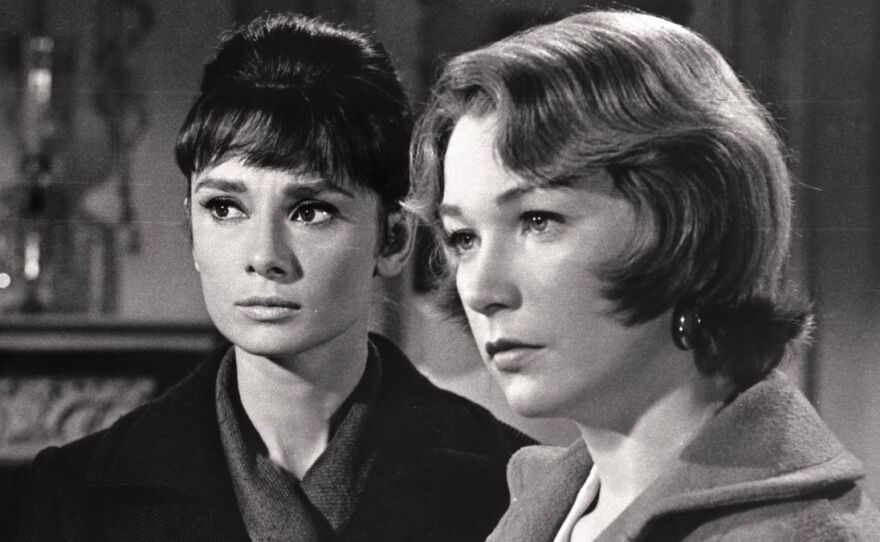Cinemas are opening up on Friday but there are still plenty of options for watching movies at home. This month TCM has a new series called Reframed while a pair of San Diego film festivals are serving up their monthly offerings.
TCM Reframed
TCM Reframed
Thursday, March 18
"The Searchers" (1956)
"Breakfast at Tiffany’s" (1961)
"Swing Time" (1936)
"Stagecoach (1939)
"Tarzan, the Ape Man" (1959)
Thursday, March 25
"My Fair Lady" (1964)
"The Children’s Hour" (1961)
"Psycho" (1960)
"Dragon Seed" (1944)
Earlier this month Turner Classic Movies unveiled a month-long series called Reframed: Classic Films in the Rearview Mirror. These are films such as "Gone with the Wind," "The Jazz Singer," and "Psycho" that have been defined as important works of cinema but when watched today from a different cultural context they can often be problematic and often offensive in terms of depictions of race, gender, and LGBT issues.
The series is not about canceling or censoring these films, nor is it about excusing them. Instead, it is about putting them into a cultural and historical context.
"The reality is we want people to keep watching these movies," said Eddie Muller, one of the five TCM hosts introducing the films. "Not because they perpetuate these stereotypes that we're trying to overcome, but because they are great films. They are important to our culture. They're important to our understanding of cinema and ourselves."
If you remove a film like "Gone With the Wind" then you don’t know how far we’ve come or how far we still have to go in terms of overcoming stereotypes and increasing diversity.
"If you remove it and cancel it, people are going to have misassumptions like, I guess there weren't racist things in these movies. There weren't sexist things in these movies. No, there were. And we're just pointing it out. But it's much better to point it out than it is to hide the film," Muller said.
Rewatching "Gone with the Wind," which I saw and loved as a young child, made me realize how a movie can powerfully present a point of view that audiences embrace. Seeing that opening scroll describe "a pretty world where gallantry took its last bow" and a world of "ladies fair, master and slave" as a dream remembered made me think about how many kids like me had their early ideas of the South and slavery shaped by seeing a film like that and how it was simply accepted as an accurate depiction at the time. Understanding the power of film and understanding how those images can shape perceptions is vital to discuss to understand how stereotypes and racist ideas can be formulated and sustained through pop culture.
But there are also films like John Ford’s "The Searchers," playing this week on TCM along with Ford's earlier "Stagecoach," that can open a discussion.
"It raises the question, 'Is this a racist movie or is this a movie about racism?'" Muller said. "And that's a conversation that you have to have with a lot of these films. I mean there are a lot of racist Westerns, right? Then there are these Westerns that are about racism and honestly, John Ford has made both of them. But 'The Searchers' is where I think he started to second guess the history that he was putting out there and saying there are some problematic things here."
While Ford's films are definitely not enlightened in regards to Native Americans and at times are offensively racist it is worth noting that in "The Searchers" there is a question as to who the real villain of the film is, the Native Americans or Wayne's harsh, unrelenting character. Also in his 1939 film "Stagecoach" he, on the one hand, makes the Native Americans the stereotyped villains but when he has a chance to show close-ups of them, he gives them genuine dignity and humanity even if it for a brief moment. Again, neither of these things excuse his films for other flaws but while other films grossly caricatured Native Americans it is interesting to see even these minor breaks in the standard Hollywood stereotypes.
TCM highlights films that reveal the incremental steps Hollywood has taken toward trying to be more representational of a diverse array of stories. Like William Wyler’s "The Children’s Hour" from 1961 in which Shirley MacLaine plays a lesbian who is stigmatized.
"But it's totally compassionate towards her. The film is totally compassionate towards her," Muller said.
The film is a contrast to the earlier adaptation of Lillian Hellman's play from the 1930s, "These Three," which completely eliminated the LGBTQ themes of the play. Wyler's film is far from perfect but it does reflect the attitudes of the 1960s or maybe more accurately the decade before, and we know those attitudes are no longer acceptable yet with the proper context it can be viewed as Hollywood’s attempt to at least move in the right direction. We need these baby steps to get to films like "Go Fish" and "The Watermelon Woman."
"History is a wheel and the wheel turns and we seem to be compelled to repeat the same things over and over again," Muller said. "But the wheel is always rolling forwards. The wheel doesn't go back. History does not go back. It repeats, but it doesn't reverse. So now we are learning these things and the wheel is going forward. And do you want these movies to be with us on that trip or do we leave them behind? And I don't want to leave them behind."
He suggests it is better to feel queasy about these Hollywood stereotypes and own that discomfort rather than to hide these films away to gloss over an unpleasant past. TCM Reframed provides a great opportunity to revisit problematic films from a more enlightened point of view so that we can be critical of depictions of race, gender, and sexual orientation but also still able to appreciate a film's artistry or the contributions of the many people who work on a film and may deserve recognition completely apart of a film's content.

'Luz' presented by FilmOut San Diego
Also available this week is Jon Garcia's "Luz," the monthly feature film selection from FilmOut, San Diego’s LGBTQ Film Festival. The film is currently available online and ticket sales support the festival while it is unable to hold its in-person event.
'Martin Eden' presented by San Diego Italian Film Festival

One more local option is San Diego Italian Film Festival's showcasing of Martin Eden, an Italian adaptation of Jack London’s classic American novel. In addition to the virtual screening that is currently available, there will also be an online discussion with the director and screenwriter this Sunday. You can read my full review of the film here.
So plenty of options if you are not quite ready to venture out into a cinema.







